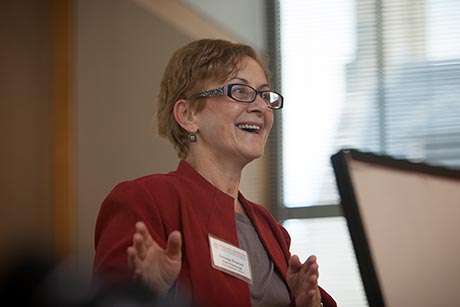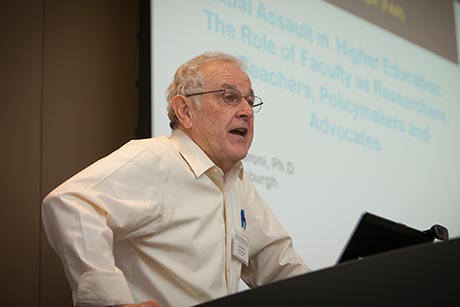Faculty symposium looks at sexual assault in higher ed
By Nancy Doolittle


Faculty nationwide largely have been absent in discussions about sexual violence on university campuses, according to Lynette Chappell-Williams, associate vice president for inclusion and workforce diversity.
To change that, she helped organize an April 28 symposium to give faculty from different colleges and universities an opportunity to discuss their vital roles – as teachers, advocates, researchers and policymakers – in addressing and preventing sexual violence on college campuses.
“Since 2011, when the Department of Education issued a ‘Dear Colleague’ letter to clarify the ways in which Title IX applies to sexual harassment and sexual assault, there has been extensive dialogue by university senior leadership, students, student services personnel and Title IX coordinators about sexual assault on campuses,” said Chappell-Williams. “It was past time to bring in the voices of the faculty to discuss these crucial topics.”
Sexual assault is “a difficult problem that requires a comprehensive solution,” said Simona Sharoni, professor of gender and women’s studies at SUNY-Plattsburgh and co-founder of Faculty Against Rape (FAR). FAR is a volunteer-run collective dedicated to increasing faculty involvement in confronting campus sexual assault.
Sharoni noted that faculty tend not to get involved for several reasons, including fear of retribution for speaking out. Junior, untenured faculty are especially at risk, she said, and have been known to lose their jobs or suffer in their careers when they have taken an activist approach. Increasing the number of tenured faculty who speak out against sexual violence would dilute the risk of retaliation and would increase the urgency of the message, she said.
Faculty also can get involved in university policymaking; they can conduct research in the factors that contribute to a culture that condones sexual violence; and they can receive training in what to do when a student asks for help or advice following an incident, she said.
Bill Flack, associate professor of psychology at Bucknell University and co-founder of FAR, noted that those who wish to engage faculty in the discussion should come to the topic from a data-driven perspective. He reviewed several surveys of sexual assault on campus, some of which are limited in their usefulness by the number and variety of campuses they included and some by the approach they took. But he believes it is fair to assert that about 1 in 4 or 1 in 5 women will be sexually assaulted while in college, and he said most surveys show that in the majority of cases drug or alcohol use was involved. Fraternity membership, class year, time within the academic year and social or academic functions also play a role, he said. Most perpetrators (9 in 10) are acquaintances or friends.
Sharoni said that while the press recently has focused on incidents that have been later discredited, in actuality only 2.2 percent of sexual assault reports are “unfounded.”
Discussions stressed the importance of having senior administration take the lead in addressing sexual assault concerns, including administering surveys on sexual assault and reporting their findings. Department meetings and other faculty venues can be used to engage faculty. Several agreed that student mobilization has been key to gaining campus momentum and support. Other topics included the incorporation of sexual assault prevention efforts into the curriculum; how faculty can serve as effective support networks for individuals who have experienced, or been accused of, sexual assault; how faculty can effectively create or revise sexual assault complaint procedures; and how faculty can engage in research in sexual assault concerns.
Thirty-six faculty members from Cornell, the Massachusetts Institute of Technology, State University of New York campuses in Binghamton and Oswego, Williams College, Wells College and the University of Delaware attended.
The symposium was organized by Cornell professors Beth Livingston, Ron Booker and Jane Mt. Pleasant, Africana Librarian Eric Acree, Flack, Sharoni and Cornell’s Department of Inclusion and Workforce Diversity.
Media Contact
Get Cornell news delivered right to your inbox.
Subscribe